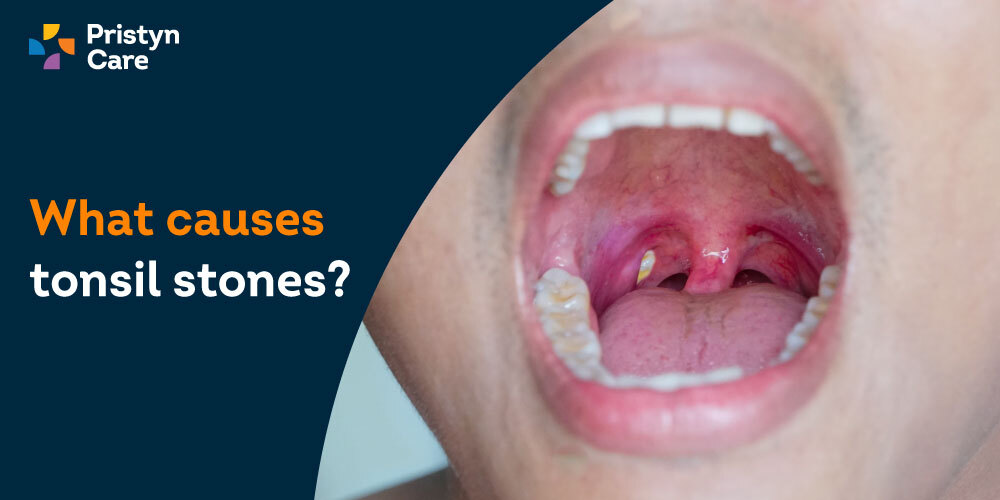![]() Views: 44,570
Views: 44,570
What causes tonsil stones?
Read ahead to find out more about tonsil stones, their causes, signs, prevention, etc.
Dedicated Support at Every Step!
Our Doctors are available 24 hours a day, 7 days a week to help you!
Table of Contents
What are tonsil stones?
Tonsil stones are hard lumps that form in the tonsils when foreign objects like food particles, bacteria, mucus, etc., are trapped and calcified in the tonsil pockets. They usually look like small white or yellow pebbles that are stuck in the throat. The most obvious symptoms associated with tonsil stones are bad breath, throat pain, feeling of having something stuck in your throat, difficulty in swallowing, etc.
While most people consider tonsil stones similar to tonsillitis, there is a distinct difference between both. Tonsillitis is a tonsil infection and leads to red and inflamed tonsils, while tonsil stones do not affect the tonsils themselves. While you can treat tonsil stones at home, you should consult a doctor before attempting home remedies. In rare cases, you may need a tonsillectomy for tonsil stone treatment as well.
No Cost EMI, Hassle-free Insurance Approval
Who is more likely to get tonsil stones?
Tonsil stones, or throat stones, usually occur in people who have more tonsillar crypts. Tonsillar crypts are folds, gaps, and crevices located between the tonsils. They are completely normal, but they often trap bacteria, food particles, mucus, and other foreign bodies, leading to tonsil issues like tonsil stones, tonsillitis, strep throat, mononucleosis, oral cancer, etc. Tonsil stones also often occur in people who have had a lot of tonsil infections, especially during their teenage years.
Since tonsillar crypts are a normal part of the body physiology, they can’t be eliminated or treated. The only way to prevent tonsil problems caused due to tonsillar crypts is to maintain oral hygiene and cleanse tonsils by gargling regularly.
How can you know if you have tonsil stones?
As discussed above, sometimes, when people have small tonsil stones, they may not even notice them. Some common tonsil stone signs and symptoms that can help you identify their presence are:
- Halitosis, foul breath
- Feeling of something being stuck in the throat, with a constant urge to cough
- Earache
- Sore throat
- Bad taste in mouth
- Small white/yellow stones in your throat mucus
- Difficulty in swallowing
- Hoarse voice
- Small white patches on the tonsils
- Persistent throat infections that can’t be treated with just medications
In addition to these signs, you can also get a diagnostic evaluation from an ENT doctor near you for further confirmation. Diagnostic evaluation generally includes a physical exam, throat swab, X-rays, and other imaging tests (only if necessary).
How are tonsil stones treated?
Tonsil stones can be treated both conservatively and surgically. Generally, conservative treatment is more common. Conservative treatments for tonsil stones include medication, saltwater gargles, etc. in most cases, tonsil stones can be gently tugged out from the tonsil folds by massaging gently. However, if the stones are too big or are causing the patient too much discomfort, surgical treatment may be needed. Surgical treatment for tonsil stones is performed through a tonsillectomy.
How can tonsil stones be prevented?
You can prevent tonsil stones by following the given tips:
- Brush and floss regularly. You should brush the front and back of your tongue as well. Maintaining proper oral hygiene reduces the chances of debris getting stuck in your tonsils.
- Quit smoking and tobacco chewing. Smoking releases harmful debris into your throat that can increase the likelihood of tonsil stones.
- Gargle with salt water to help dislodge anything that might be stuck in your throat and maintain throat hygiene.
- Rinse your mouth whenever you eat something. If you feel something is stuck in your throat, then use a water pick to help dislodge it.
- Drink plenty of water throughout the day.
Tonsil stones are not harmful themselves, but they can lead to plenty of discomforts. If you think you have tonsil stones or any other related tonsil issues, you should consult Pristyn Care ENT specialists for treatment immediately.








